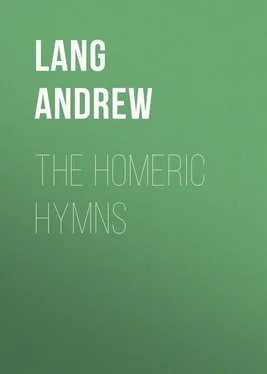Andrew Lang - The Homeric Hymns
Здесь есть возможность читать онлайн «Andrew Lang - The Homeric Hymns» — ознакомительный отрывок электронной книги совершенно бесплатно, а после прочтения отрывка купить полную версию. В некоторых случаях можно слушать аудио, скачать через торрент в формате fb2 и присутствует краткое содержание. Жанр: foreign_antique, foreign_prose, на английском языке. Описание произведения, (предисловие) а так же отзывы посетителей доступны на портале библиотеки ЛибКат.
- Название:The Homeric Hymns
- Автор:
- Жанр:
- Год:неизвестен
- ISBN:нет данных
- Рейтинг книги:4 / 5. Голосов: 1
-
Избранное:Добавить в избранное
- Отзывы:
-
Ваша оценка:
- 80
- 1
- 2
- 3
- 4
- 5
The Homeric Hymns: краткое содержание, описание и аннотация
Предлагаем к чтению аннотацию, описание, краткое содержание или предисловие (зависит от того, что написал сам автор книги «The Homeric Hymns»). Если вы не нашли необходимую информацию о книге — напишите в комментариях, мы постараемся отыскать её.
The Homeric Hymns — читать онлайн ознакомительный отрывок
Ниже представлен текст книги, разбитый по страницам. Система сохранения места последней прочитанной страницы, позволяет с удобством читать онлайн бесплатно книгу «The Homeric Hymns», без необходимости каждый раз заново искать на чём Вы остановились. Поставьте закладку, и сможете в любой момент перейти на страницу, на которой закончили чтение.
Интервал:
Закладка:
Andrew Lang
The Homeric Hymns A New Prose Translation; and Essays, Literary and Mythological
PREFACE
To translate the Hymns usually called “Homeric” had long been my wish, and, at the Publisher’s suggestion, I undertook the work. Though not in partnership, on this occasion, with my friend, Mr. Henry Butcher (Professor of Greek in the University of Edinburgh), I have been fortunate in receiving his kind assistance in correcting the proofs of the longer and most of the minor Hymns. Mr. Burnet, Professor of Greek in the University of St. Andrews, has also most generously read the proofs of the translation. It is, of course, to be understood that these scholars are not responsible for the slips which may have wandered into my version, the work of one whose Greek has long “rusted in disuse.” Indeed I must confess that the rendering “Etin” for πελωρ is retained in spite of Mr. Butcher, who is also not wholly satisfied with “gledes of light,” and with “shieling” for a pastoral summer station in the hills. But I know no word for it in English south of Tweed.
Mr. A. S. Murray, the Head of the Classical Department in the British Museum, has also been good enough to read, and suggest corrections in the preliminary Essays; while Mr. Cecil Smith, of the British Museum, has obligingly aided in selecting the works of art here reproduced.
The text of the Hymns is well known to be corrupt, in places impossible, and much mended by conjecture. I have usually followed Gemoll ( Die Homerischen Hymnen , Leipzig, 1886), but have sometimes preferred a MS. reading, or emendations by Mr. Tyrrell, by Mr. Verral, or the admirable suggestions of Mr. Allen. My chief object has been to find, in cases of doubt, the phrases least unworthy of the poets. Too often it is impossible to be certain as to what they really wrote.
I have had beside me the excellent prose translation by Mr. John Edgar (Thin, Edinburgh, 1891). As is inevitable, we do not always agree in the sense of certain phrases, but I am far from claiming superiority for my own attempts.
The method employed in the Essays, the anthropological method of interpreting beliefs and rites, is still, of course, on its trial. What can best be said as to its infirmities, and the dangers of its abuse, and of system-making in the present state of the evidence, will be found in Sir Alfred Lyall’s “Asiatic Studies,” vol. ii. chaps. iii. and iv. Readers inclined to pursue the subject should read Mr. L. R. Farnell’s “Cults of the Greek States” (Clarendon Press, 1896), Mr. J. G. Frazer’s “Golden Bough,” his “Pausanias,” and Mr. Hartland’s work on “The Myth of Perseus.” These books, it must be observed, are by no means always in agreement with my own provisional theories.
ESSAYS INTRODUCTORY
THE SO-CALLED HOMERIC HYMNS
“The existing collection of the Hymns is of unknown editorship, unknown date, and unknown purpose,” says Baumeister. Why any man should have collected the little preludes of five or six lines in length, and of purely conventional character, while he did not copy out the longer poems to which they probably served as preludes, is a mystery. The celebrated Wolf, who opened the path which leads modern Homerologists to such an extraordinary number of divergent theories, thought rightly that the great Alexandrian critics before the Christian Era, did not recognise the Hymns as “Homeric.” They did not employ the Hymns as illustrations of Homeric problems; though it is certain that they knew the Hymns, for one collection did exist in the third century B.C. 1 1 Baumeister, p. 94, and note on Hymn to Hermes, 51, citing Antigonus Carystius. See, too, Gemoll, Die Homerischen Hymnen , p. 105.
Diodorus and Pausanias, later, also cite “the poet in the Hymns,” “Homer in the Hymns”; and the pseudo-Herodotus ascribes the Hymns to Homer in his Life of that author. Thucydides, in the Periclean age, regards Homer as the blind Chian minstrel who composed the Hymn to the Delian Apollo: a good proof of the relative antiquity of that piece, but not evidence, of course, that our whole collection was then regarded as Homeric. Baumeister agrees with Wolf that the brief Hymns were recited by rhapsodists as preludes to the recitation of Homeric or other cantos. Thus, in Hymn xxxi. 18, the poet says that he is going on to chant “the renowns of men half divine.” Other preludes end with a prayer to the God for luck in the competition of reciters.
This, then, is the plausible explanation of most of the brief Hymns – they were preludes to epic recitations – but the question as to the long narrative Hymns with which the collection opens is different. These were themselves rhapsodies recited at Delphi, at Delos, perhaps in Cyprus (the long Hymn to Aphrodite), in Athens (as the Hymn to Pan, who was friendly in the Persian invasion), and so forth. That the Pisistratidæ organised Homeric recitations at Athens is certain enough, and Baumeister suspects, in xiv., xxiii., xxx., xxxi., xxxii., the hand of Onomacritus, the forger of Oracles, that strange accomplice of the Pisistratidæ. The Hymn to Aphrodite is just such a lay as the Phæacian minstrel sang at the feast of Alcinous, in the hearing of Odysseus. Finally Baumeister supposes our collection not to have been made by learned editors, like Aristarchus and Zenodotus, but committed confusedly from memory to papyrus by some amateur. The conventional attribution of the Hymns to Homer, in spite of linguistic objections, and of many allusions to things unknown or unfamiliar in the Epics, is merely the result of the tendency to set down “masterless” compositions to a well-known name. Anything of epic characteristics was allotted to the master of Epic. In the same way an unfathered joke of Lockhart’s was attributed to Sydney Smith, and the process is constantly illustrated in daily conversation. The word υμνος, hymn, had not originally a religious sense: it merely meant a lay. Nobody calls the Theocritean idylls on Heracles and the Dioscuri “hymns,” but they are quite as much “hymns” (in our sense) as the “hymn” on Aphrodite, or on Hermes.
To the English reader familiar with the Iliad and Odyssey the Hymns must appear disappointing, if he come to them with an expectation of discovering merits like those of the immortal epics. He will not find that they stand to the Iliad as Milton’s “Ode to the Nativity” stands to “Paradise Lost.” There is in the Hymns, in fact, no scope for the epic knowledge of human nature in every mood and aspect. We are not so much interested in the Homeric Gods as in the Homeric mortals, yet the Hymns are chiefly concerned not with men, but with Gods and their mythical adventures. However, the interest of the Hymn to Demeter is perfectly human, for the Goddess is in sorrow, and is mingling with men. The Hymn to Aphrodite, too, is Homeric in its grace, and charm, and divine sense of human limitations, of old age that comes on the fairest, as Tithonus and Anchises; of death and disease that wait for all. The life of the Gods is one long holiday; the end of our holiday is always near at hand. The Hymn to Dionysus, representing him as a youth in the fulness of beauty, is of a charm which was not attainable, while early art represented the God as a mature man; but literary art, in the Homeric age, was in advance of sculpture and painting. The chief merit of the Delian Hymn is in the concluding description of the assembled Ionians, happy seafarers like the Phæacians in the morning of the world. The confusions of the Pythian Hymn to Apollo make it less agreeable; and the humour of the Hymn to Hermes is archaic. All those pieces, however, have delightfully fresh descriptions of sea and land, of shadowy dells, flowering meadows, dusky, fragrant caves; of the mountain glades where the wild beasts fawn in the train of the winsome Goddess; and the high still peaks where Pan wanders among the nymphs, and the glens where Artemis drives the deer, and the spacious halls and airy palaces of the Immortals. The Hymns are fragments of the work of a school which had a great Master and great traditions: they also illustrate many aspects of Greek religion.
Читать дальшеИнтервал:
Закладка:
Похожие книги на «The Homeric Hymns»
Представляем Вашему вниманию похожие книги на «The Homeric Hymns» списком для выбора. Мы отобрали схожую по названию и смыслу литературу в надежде предоставить читателям больше вариантов отыскать новые, интересные, ещё непрочитанные произведения.
Обсуждение, отзывы о книге «The Homeric Hymns» и просто собственные мнения читателей. Оставьте ваши комментарии, напишите, что Вы думаете о произведении, его смысле или главных героях. Укажите что конкретно понравилось, а что нет, и почему Вы так считаете.












